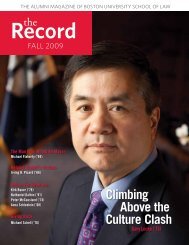the nature of representation: the cherokee right ... - Boston University
the nature of representation: the cherokee right ... - Boston University
the nature of representation: the cherokee right ... - Boston University
Create successful ePaper yourself
Turn your PDF publications into a flip-book with our unique Google optimized e-Paper software.
124 PUBLIC INTEREST LAW JOURNAL [Vol. 15<br />
Executive “is incompetent to grant” a delegate privilege because “all <strong>the</strong> branches<br />
<strong>of</strong> Government” areneededforsuchadecisioncouldbeusedbydetractors<strong>of</strong><strong>the</strong><br />
New Echota promise in efforts to invalidate <strong>the</strong> promise. However, by going on to<br />
say that Congress could make such a decision, Article III indicates that <strong>the</strong> New<br />
Echota promise is valid, for Congress approved <strong>the</strong> Treaty in its entirety. Article<br />
III fails to provide any definite promise to <strong>the</strong> Cherokees and Article IV includes<br />
only <strong>the</strong> lesser agent promise: “A wish is also expressed that an agent, to represent<br />
<strong>the</strong> <strong>right</strong>s and interests <strong>of</strong> <strong>the</strong> Cherokees, may remain at <strong>the</strong> city <strong>of</strong> Washington<br />
after a removal takes place. This request is admitted.” 166 The fourth article<br />
demonstrates both that <strong>the</strong> Cherokees saw <strong>the</strong> promise <strong>of</strong> an agent and a promise <strong>of</strong><br />
a delegate as distinct promises and that <strong>the</strong> U.S. government at <strong>the</strong> time <strong>of</strong> this<br />
agreement was not yet prepared to go as far as it would go in <strong>the</strong> 1835 New Echota<br />
Treaty in establishing a Cherokee delegate.<br />
3. The Delegate Promise<br />
In 1835, as a part <strong>of</strong> a more general treaty removing <strong>the</strong> Cherokees, <strong>the</strong> U.S.<br />
government granted <strong>the</strong> Cherokees a <strong>right</strong> to a delegate to Congress. This promise<br />
resides in Article 7 <strong>of</strong> <strong>the</strong> New Echota Treaty:<br />
The Cherokee nation having already made great progress in civilization . . . it<br />
is stipulated that <strong>the</strong>y shall be entitled to a delegate in <strong>the</strong> House <strong>of</strong><br />
Representatives <strong>of</strong> <strong>the</strong> United States whenever Congress shall make provision<br />
for <strong>the</strong> same. 167<br />
The promise reflects <strong>the</strong> liberality that <strong>the</strong> U.S. government expressed as U.S.<br />
policy and also acknowledged as fundamental for <strong>the</strong> protection <strong>of</strong> Cherokee <strong>right</strong>s.<br />
Unlike <strong>the</strong> earlier Treaty with <strong>the</strong> Delawares and <strong>the</strong> deputy and agent promises,<br />
this promise is an affirmative <strong>right</strong>, subject only to minor qualification. Critics <strong>of</strong><br />
<strong>the</strong> promise initially can highlight “whenever Congress shall make provision for<br />
<strong>the</strong> same” to suggest <strong>the</strong> promise is as meaningless as <strong>the</strong> Supreme Court found <strong>the</strong><br />
deputy <strong>right</strong> to be. But <strong>the</strong> differences between this promise and <strong>the</strong> earlier, lesser<br />
promises demonstrate that being “entitled to a delegate” is an affirmative <strong>right</strong><br />
granted to <strong>the</strong> Cherokees.<br />
There are conflicting histories regarding <strong>the</strong> <strong>right</strong> versus obligation to seat<br />
SATZ, supra note 85, at 217.<br />
166 Articles <strong>of</strong> agreement entered into between John H. Eaton, Commissioner on <strong>the</strong><br />
part <strong>of</strong> <strong>the</strong> United States, and <strong>the</strong> Cherokee delegation <strong>of</strong> Indians, June 19, 1834, S. Exec.<br />
Doc. No. 23-7, 23d Cong., 1st Sess., at 4. The agent promise included payment terms<br />
from <strong>the</strong> U.S. government and a provision that <strong>the</strong> President could terminate <strong>the</strong> agent’s<br />
post after <strong>the</strong> initial five years.<br />
167 Treaty with <strong>the</strong> Cherokee, supra note 1, at 482 (emphasis added); see also<br />
Agreement with <strong>the</strong> Cherokee, Art. 8, U.S.-Cherokee, Mar. 14, 1835, Senate Doc. No.<br />
120, 25th Congress, 2d session, p. 459. However, <strong>the</strong> Mar. 14, 1835 agreement is not a<br />
ratified treaty, and <strong>the</strong>refore <strong>the</strong> New Echota Treaty is <strong>the</strong> text on which <strong>the</strong> promise<br />
rests.









